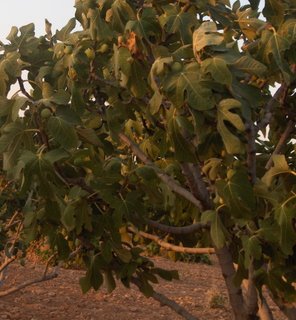By the way, Kanatlı, Savcı, Müdür and Baltalı were below in October 2012...
Barak Ovası, Antep Fıstığı Diyarı, Barakeli, Barak Kültürü, Anılar ve Hikâyeler... Dr. Göksel Tiryaki
17 Kasım 2013
The father and his children in the west side of the wall of their adobe (house) with a carpet's view...
06 Ekim 2006
The samples of Barak Folk Music
 |
| Dr. Göksel Tiryaki's The Barak Books |
This one is also a more authentic and genuine piece.
03 Ekim 2006
And fig
29 Eylül 2006
A founder

One of the founders of Balaban was my grandfather, Haci Mahmut Agha. This picture (in the left) was taken in Gallipoli in 1942, when he was doing his second and prudential military
 service (possible Hitler's attack against Turkey during The Second World War). He sent this picture his widowed mother-in-law, who was one of the elderly in the town, with a message in the back side (below) of the picture. He said that "I am sending this picture to my esteemed mother-in-law as an eternal memory." I think, we have just realized this "eternal memory"! By the way, other picture (in the right) belongs to one of his sons.
service (possible Hitler's attack against Turkey during The Second World War). He sent this picture his widowed mother-in-law, who was one of the elderly in the town, with a message in the back side (below) of the picture. He said that "I am sending this picture to my esteemed mother-in-law as an eternal memory." I think, we have just realized this "eternal memory"! By the way, other picture (in the right) belongs to one of his sons.
28 Eylül 2006
Globally Pistachios

Pistachio is very nutritious like other tree nuts. Due to its high food value and favorable taste, planting pistachio trees has become common in many parts of the world. Pistachio product as a commercial output has a special importance in the agricultural production of some countries. For instance, in 2005 worldwide production of pistachio was 501 million metric tons and 38 percent of total output was produced by Iran. It was followed by the US with 28 percent, Turkey with 12 percent, Syria with 12 percent, China with 7 percent, Greece with 2 percent and the rest of the world just about 1 percent.
27 Eylül 2006
The sweetest form of pistachios: "Baklava"...

Baklava is a favorite dessert for many people around the world, and pistachio is one of the main ingredients of baklava. As I know, there are numerous distinctive recipes and types of baklava, but the most favorite kind of baklava is made with pistachio according to many people, because pistachio's unique colour, scrumptious flavour and aromatic scent are indispensable components for many dessert lovers. My hometown Gaziantep is the most important baklava center in Tu
 rkey and may be in the world, because it has hundreds particular pastry shops specialized over many kinds of baklava. I think, the great amount of cultivation pistachios around Gaziantep is a significant factor of this result.
rkey and may be in the world, because it has hundreds particular pastry shops specialized over many kinds of baklava. I think, the great amount of cultivation pistachios around Gaziantep is a significant factor of this result.
26 Eylül 2006
The Short History of Pistachios

According to some sources, the reliable historical indication of edible nuts directs attention to pistachios, the initial archaeological discoveries date back to 6760 B.C. (in a near settlements in the Neolith) in the district of modern Jordan. Then, pistachios were soon considered as food for the rich and the distinguished groups. Despite the fact that pistachio trees have been known for a long period of time, the place of their origin is questionable. They probably come from the Middle East, Persia, and western Asia, where they grew wild in the high desert regions. The history of pistachio nuts reflects royalty, endurance and pride. The times of pistachios backs to the Holy Lands of the Middle East. A story has it that lovers used to meet under pistachio trees and listened to the cracking of their nuts below moonlit nights, which was a sign that they would be fortunate. A rare fragility, pistachios were a favorite of the Queen of Sheba, who claimed cultivation of all her land for herself and her attendants. Although known to the Romans, the pistachio appears not to have reached the Mediterranean or most of the Near East in any quantity before medieval times. More recently, pistachio has been cultivated in California (first commercial harvest in 1976) and Australia.
Kaydol:
Yorumlar (Atom)
Öne Çıkan Yayın
Barakeli'nde Bir Köy, Seydimen, Hatıralar ve Hikâyeler
"Memleket ve çocukluk, insan hangi yaşa gelirse gelsin ve ne kadar çok mekân değiştirirse değiştirsin, hep yanında taşıdığı şeylerdend...



